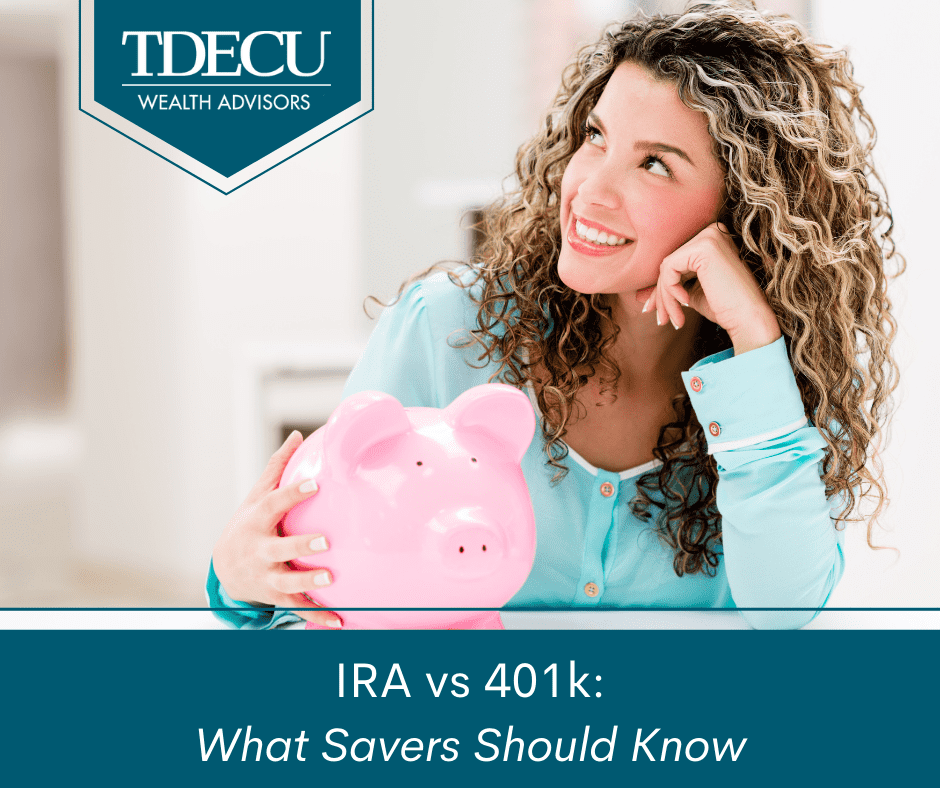As of 2018, about 58 million Americans had a 401(k), while around one-third of households owned an individual retirement account (IRA).1, 2 Yet for as commonplace as these retirement accounts can be, the nuances of contributions are a bit more complex.
Learn more about these retirement accounts and what to consider when allocating your retirement contributions.
401(k) vs. IRA: The Basics
There are several key differences between these two kinds of retirement accounts, and your unique circumstances often will dictate whether you contribute to a 401(k), an IRA, or both.
- Contribution limits. For 2021, those age 50 and older can contribute $26,000 to a 401(k) or $7,000 to an IRA; those age 49 and younger can contribute $19,500 to a 401(k) or $6,000 to an IRA.3
- Portability. Because the "I" in IRA stands for "individual," these retirement accounts are portable—you do not need to withdraw or transfer the funds when you change jobs, and you are free to choose any IRA custodian you wish. On the other hand, 401(k)s are generally tied to one's employer; when you leave that position, you may be required to roll over your 401(k) into an IRA or your new employer's 401(k) if they offer one.[1]
- Investment options. With a 401(k), retirement savers are limited to the investment funds and indices the plan provides. Sometimes, these options can be limited. With an IRA, account holders can choose their retirement custodian, which generally opens up access to a broader range of investment options.[2]
- Tax treatment. IRAs can be divided into two categories: a traditional IRA, where pre-tax contributions are tax-deductible, or a Roth IRA, where contributions are made post-tax. At retirement, someone who withdraws funds from a traditional IRA will need to pay taxes on their withdrawal; with Roth accounts, the taxes have already been paid and so the withdrawals are tax-free. Some 401(k)s also have a Roth option, allowing the account holder to contribute post-tax funds in exchange for tax-free retirement assets.[3]
Which Account Should You Contribute to First?
If you have a 401(k) available through your employer, you can contribute to both it and any IRA at the same time, for a maximum contribution of $25,500 per year (or $33,000 for those age 50 and over).[4] But if you cannot afford to max out both accounts, you may want to consider the below framework to try and get the most bang for your buck.
First, determine whether your employer offers a match for 401(k) contributions. Any matching funds do not count against your own contributions and aren't taxed, essentially making them "free money."[5] If your employer matches, it often makes sense to contribute to this account at least enough to get the full available match. Savers may then want to consider contributing to an IRA, then returning to 401(k) contributions once the IRA has been maxed.
If your employer does not offer a company match, it may make more sense to begin your retirement savings with either a traditional or Roth IRA, since these accounts tend to have lower fees and more investment options.[6] And for those who are in a relatively low tax bracket, paying these taxes on IRA contributions now (and avoiding them in retirement) may minimize their overall tax burden.[7]
Because the decision whether to contribute to an IRA, a 401(k), or both is a highly individualized one, it is a good idea to talk it over with your financial professional before taking the plunge.
Important Disclosures:
The opinions voiced in this material are for general information only and are not intended to provide specific advice or recommendations for any individual. To determine which investment(s) may be appropriate for you, consult your financial professional prior to investing. All performance referenced is historical and is no guarantee of future results. All indices are unmanaged and cannot be invested into directly.
All information is believed to be from reliable sources; however, LPL Financial makes no representation as to its completeness or accuracy.
This information is not intended to be a substitute for specific individualized tax advice. We suggest that you discuss your specific tax issues with a qualified tax advisor.
Contributions to a traditional IRA may be tax deductible in the contribution year, with current income tax due at withdrawal. Withdrawals prior to age 59 ½ may result in a 10% IRS penalty tax in addition to current income tax.
The Roth IRA offers tax deferral on any earnings in the account. Withdrawals from the account may be tax free, as long as they are considered qualified. Limitations and restrictions may apply. Withdrawals prior to age 59 ½ or prior to the account being opened for 5 years, whichever is later, may result in a 10% IRS penalty tax. Future tax laws can change at any time and may impact the benefits of Roth IRAs. Their tax treatment may change.
1 https://www.ici.org/faqs/faq/401k/faqs_401k
2 https://www.investopedia.com/articles/retirement/110116/6-surprising-facts-about-retirement.asp
3 https://www.kiplinger.com/retirement/retirement-plans/603711/2022-ira-and-401k-contribution-limits
Content Provider: WriterAccess
LPL Tracking 1-05091415
[1] https://www.investopedia.com/articles/personal-finance/092415/guide-rollover-401k-new-employer.asp
[2] https://www.investopedia.com/ask/answers/12/401k.asp
[3] https://www.schwab.com/resource-center/insights/content/roth-vs-traditional-401-k-which-is-better
[4] https://www.irs.gov/newsroom/401k-contribution-limit-increases-to-19500-for-2020-catch-up-limit-rises-to-6500
[5] https://www.irs.gov/retirement-plans/matching-contributions-help-you-save-more-for-retirement
[6] https://money.usnews.com/money/retirement/401ks/articles/ira-versus-401-k-which-is-better
[7] https://www.kiplinger.com/retirement/retirement-plans/roth-iras/601720/who-should-consider-a-roth-ira-and-why-now
